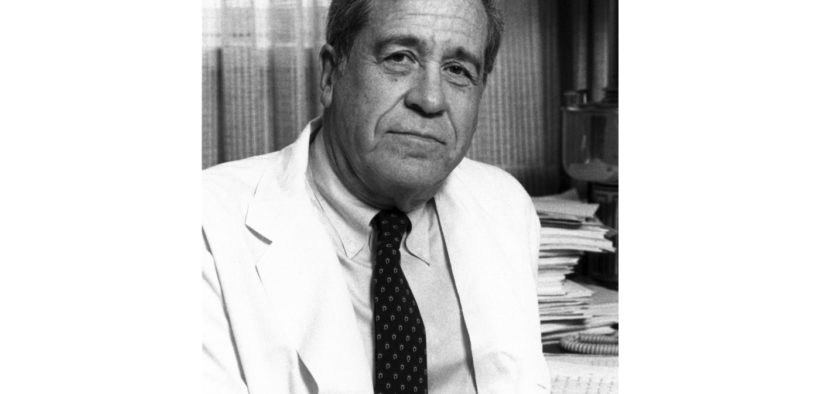The Legendary Healer

A tribute to Dr Bernard Fisher, who revolutionised the treatment of breast cancer
By christina tom jose
Mid-October 2018 brought saddening news to the oncologist community worldwide; Dr. Bernard Fisher, a pioneering figure in the field of breast cancer, had died. Dr. Fisher is known to have revolutionized the treatment of breast cancer. Perhaps the most notable of his achievements is his work in successfully ending the practice of radical mastectomy as the treatment for breast cancer, which had been followed for 75 years till then. Through his pioneering research, he was able to drastically increase survival rates and the effectiveness of therapy.
Dr. Fisher was born in the city of Pittsburgh, where he continued to pursue his career as a surgeon. He graduated from the University of Pittsburgh School of Medicine in 1943. Starting off as an assistant professor at the very same University, he wasn’t initially interested in cancer. In his early days as a researcher, he focused on liver regeneration and transplant. He was able to successfully regenerate and transplant livers in rats, after which he served as a research fellow at the London Postgraduate Medical School, Hammersmith Hospital.

The spring of 1957 turned Dr. Fisher career in a new direction; I S Ravdin MD, his mentor at the university, requested him to join 22 other surgeons in discourse over the Surgical Adjuvant Chemotherapy Breast Project, which was later christened the famous National Surgical Adjuvant Breast and Bowel Project (NSABP). Ironically, Fisher is later quoted to have said he wasn’t “the least bit interested in breast cancer.” Such was his respect for Ravdin, a former army surgeon who had operated on President Eisenhower, that he took his request as no less than a command.it was at this meeting that Dr. Fisher realized how little interest prevailed for the field. His early reluctance to give up his studies on liver transplantation to study cancer was replaced by sheer wonder for the metastatic growth of tumours. He was also deeply interested in clinical trials, then a completely new concept. That was the start of over four decades spent in studying breast cancer.
Perhaps the most notable of dr fisher’s achievements is his work in successfully ending the practice of radical mastectomy as the treatment for breast cancer, which had been followed for 75 years until then.
Dr. Fisher’s clinical trials showed hopeful results. In his studies conducted over 800 women, it was found that through chemotherapy a significant number of premenopausal women were able to survive without recurrence. However, because all women were not benefitted, and there were some side effects, physicians were not ready to follow systematic adjuvant therapy.
Before Dr. Fisher’s findings were out, Halsted’s anatomic hypothesis prevailed over deciding treatment methods; it stated that malignant cancer cells from the breast pass through the lymph nodes, and surgical requirements of the breasts and lymph nodes were necessary to prevent a recurrence. However, Dr. Fisher put forth that breast cancer, being a systemic disease, malignant cells are likely to be spread all through the body even before diagnosis, thus challenging the effectiveness of radical mastectomy in ensuring optimal survival. Instead, he suggested breast-sparing surgery like lumpectomy, little more than the tumour and a few surrounding tissues, which would yield similar results sans the physical mutilation that is inevitable in radical mastectomy.
Many awards and accolades have been showered on dr fisher for his contributions to medical research, including the albert lasker award for clinical medical research, and american association for cancer research award for lifetime achievement in cancer research..
Numerous awards and accolades have been showered upon Dr. Fisher for his contributions to medical research, including the Albert Lasker Award for Clinical Medical Research and American Association for Cancer Research Award for Lifetime Achievement in Cancer Research. He was also a part of the President’s Cancer Panel and the National Cancer Advisory Board. By establishing a scientific approach towards the study of breast cancer, Dr. Fisher was successful in drastically changing the way the disease was perceived and treated. “No clinical therapy should be determined by emotion or conviction—the determinant must be the scientific method,” says the legend in a 2009 video interview. He turned a mostly ignored field of study to prove how research-backed medical decisions can lead to a better quality of life for the patients and their caregivers. His work has created a model of treatment that is not only followed in breast cancer but also guides the broader spectrum of cancer research.
ALSO READ ABOUT
















